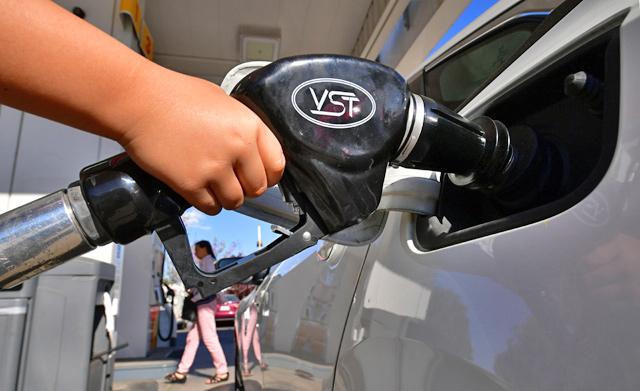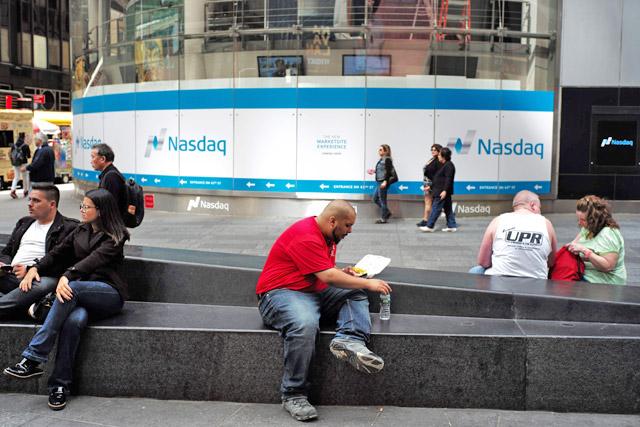You are here
Oil prices surge after attacks on two Saudi facilities
By AFP - Sep 16,2019 - Last updated at Sep 16,2019

In this photo taken on April 9, a child pumps gas for his father at a gas station in Los Angeles, as southern California gas prices, already the highest in the nation, continue to rise (AFP file photo)
HONG KONG — Oil prices saw a record surge on Monday after attacks on two Saudi facilities slashed output in the world's top exporter by half, fuelling fresh geopolitical fears as US President Donald Trump blamed Iran and raised the possibility of a military strike on the country.
Brent futures surged $12 in the first few minutes of business — the most in dollar terms since they were launched in 1988 and representing a jump of nearly 20 per cent — while WTI jumped more than $8, or 15 per cent.
Both contracts pared the gains as the day wore on but were still up nearly 10 per cent.
The attack — claimed by Tehran-backed Houthi rebels in neighbouring Yemen, where a Saudi-led coalition is bogged down in a five-year war — hit two sites owned by state-run giant Aramco and effectively shut down 6 per cent of the global oil supply.
Trump said on Sunday the US was "locked and loaded" to respond to the attack, but was in talks with Riyadh.
US Secretary of State Mike Pompeo said: "The United States will work with our partners and allies to ensure that energy markets remain well supplied and Iran is held accountable for its aggression."
Tehran denies the accusations but the news revived fears of a conflict in the tinderbox Middle East after a series of attacks on oil tankers earlier this year that were also blamed on Iran.
But The New York Times reported that US officials had satellite images showing the attacks — possibly with drones and cruise missiles — had come from the north or northwest. That indicated they were sourced in the northern Persian Gulf, Iran or Iraq, rather than Yemen.
China on Monday called for the US and Iran to "exercise restraint".
"Tensions in the Middle East are rising quickly, meaning this story will continue to reverberate this week even after the knee-jerk panic in oil markets this morning," said Jeffrey Halley, senior market analyst at OANDA.
Trump authorised the release of US supplies from its Strategic Petroleum Reserve, while Aramco said more than half of the five million barrels of production lost will be restored by tomorrow.
But the strikes raise concerns about the security of supplies from Saudi Arabia and elsewhere.
"The implications of these attacks are far-reaching and lasting, going well beyond the immediate disruption to albeit a very large portion of global output," said Neil Wilson, chief market analyst at Markets.com.
"It is a material escalation in the risks to supply and, in short, traders now worry that Saudi Arabian oil production can be swiftly and easily knocked out."
Energy firms surge
Oil prices had dropped last week after news that Trump had fired his anti-Iran hawkish national security adviser John Bolton, which was seen as paving the way for an easing of tensions in the region.
"One thing we can say with confidence is that if part of the reason for last week's fall in oil and improvement in geopolitical risk sentiment was the news of John Bolton's sacking... and thought this was a precursor to some form of rapprochement between Trump and Iran, then it is no longer valid," said Ray Attrill at National Australia Bank.
The surge in crude lit a fire under energy firms, with Hong Kong-listed CNOOC up 7.4 per cent and PetroChina 4.3 per cent higher. Woodside Petroleum rallied more than four per cent in Sydney.
However, airlines took a hit from the prospect of higher fuel costs. Cathay Pacific dropped 4 per cent in Hong Kong, Air China dropped 4.6 per cent in Shanghai and Qantas dived more than four per cent in Sydney.
Asian stock markets were mostly down after last week's rally that was fuelled by China-US trade hopes, while investors are awaiting a key Federal Reserve policy meeting hoping for another cut in interest rates.
Shanghai was marginally lower after data showed China's huge economy showed further signs of slowing last month, with retail sales, fixed-asset investment and industrial production all missing forecasts.
Hong Kong sank 0.8 per cent after fresh violent protests struck the city at the weekend, while Singapore shed 0.1 per cent and Jakarta sank 2 per cent. There were also losses in Mumbai and Wellington. Tokyo was closed for a holiday.
Sydney added 0.1 per cent, Seoul gained 0.6 per cent and Taipei was 0.7 per cent higher.
In early trade, London fell 0.4 per cent, while Frankfurt and Paris shed 0.6 per cent apiece.
On foreign exchanges, higher-yielding currencies dropped as traders shifted to safe-haven units such as the yen and dollar, while gold — a go-to asset in times of uncertainty — rose more than one per cent.
The pound held around seven-week highs owing to easing fears of a no-deal Brexit, with eyes on a meeting between Prime Minister Boris Johnson and European Commission chief Jean-Claude Juncker that was due later in the day.
Related Articles
HONG KONG — Oil prices built on gains on Tuesday after another blistering rally, but most markets were in retreat as traders brushed off a p
HONG KONG — Oil prices pressed on with fresh gains in Asian trade on Tuesday, boosting energy firms, after Russia and Saudi Arabia indicated
HONG KONG — Oil prices dipped on Tuesday but held most of the previous day’s record gains following an attack on Saudi facilities that wiped


















